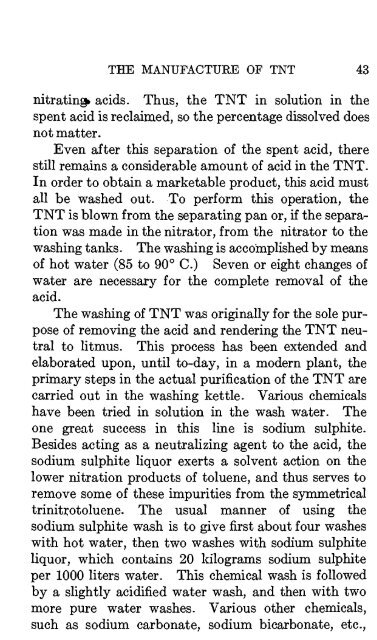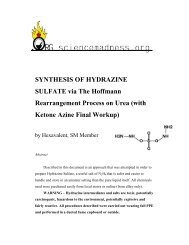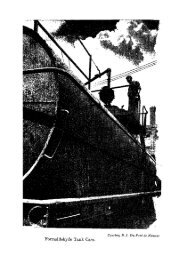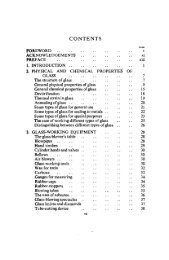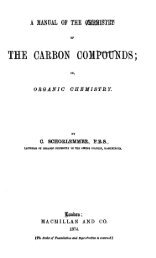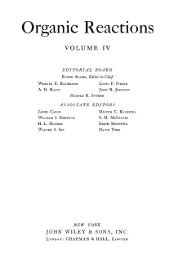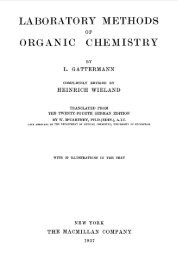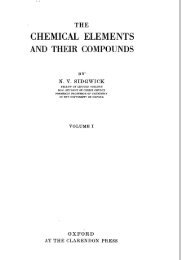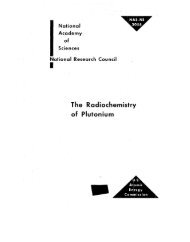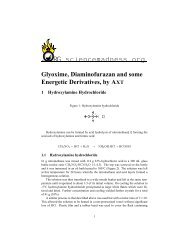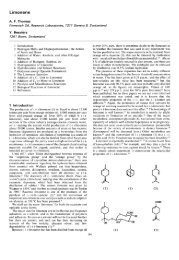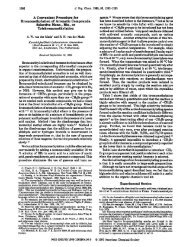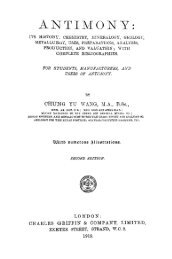TNT: Trinitrotoluenes and Mono and Dinitrotoluenes
TNT: Trinitrotoluenes and Mono and Dinitrotoluenes
TNT: Trinitrotoluenes and Mono and Dinitrotoluenes
Create successful ePaper yourself
Turn your PDF publications into a flip-book with our unique Google optimized e-Paper software.
THE MANUFACTURE OF <strong>TNT</strong> 43<br />
nitrating* acids. Thus, the <strong>TNT</strong> in solution in the<br />
spent acid is reclaimed, so the percentage dissolved does<br />
not matter.<br />
Even after this separation of the spent acid, there<br />
still remains a considerable amount of acid in the <strong>TNT</strong>.<br />
In order to obtain a marketable product, this acid must<br />
all be washed out. To perform this operation, the<br />
<strong>TNT</strong> is blown from the separating pan or, if the separation<br />
was made in the nitrator, from the nitrator to the<br />
washing tanks. The washing is accomplished by means<br />
of hot water (85 to 90° C.) Seven or eight changes of<br />
water are necessary for the complete removal of the<br />
acid.<br />
The washing of <strong>TNT</strong> was originally for the sole purpose<br />
of removing the acid <strong>and</strong> rendering the <strong>TNT</strong> neutral<br />
to litmus. This process has been extended <strong>and</strong><br />
elaborated upon, until to-day, in a modern plant, the<br />
primary steps in the actual purification of the <strong>TNT</strong> are<br />
carried out in the washing kettle. Various chemicals<br />
have been tried in solution in the wash water. The<br />
one great success in this line is sodium sulphite.<br />
Besides acting as a neutralizing agent to the acid, the<br />
sodium sulphite liquor exerts a solvent action on the<br />
lower nitration products of toluene, <strong>and</strong> thus serves to<br />
remove some of these impurities from the symmetrical<br />
trinitrotoluene. The usual manner of using the<br />
sodium sulphite wash is to give first about four washes<br />
with hot water, then two washes with sodium sulphite<br />
liquor, which contains 20 kilograms sodium sulphite<br />
per 1000 liters water. This chemical wash is followed<br />
by a slightly acidified water wash, <strong>and</strong> then with two<br />
more pure water washes. Various other chemicals,<br />
such as sodium carbonate, sodium bicarbonate, etc.,


